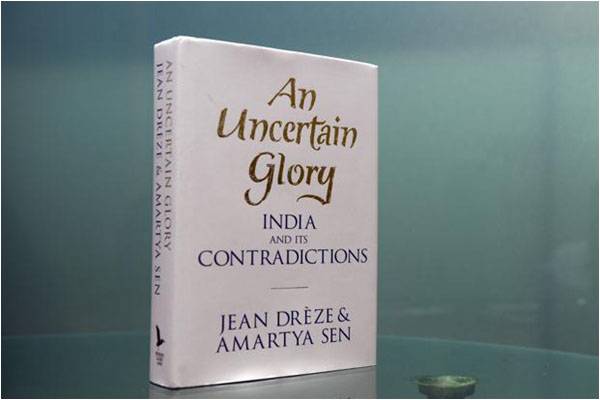
An Uncertain Glory: India and its Contradictions
Jean Dreze and Amartya Sen
Allen Lane (hardcover), 2013
PRs 2375
An Uncertain Glory: India And Its Contradictions is an enlightening book that tells its readers all about India, before she gained independence and after she broke away from colonial suppression. After India gained independence in the year 1947, she decided to adopt a political system that was democratic in nature and involved the existence of several political parties and many political rights.
The end of the colonial era saw the disappearance of the continual famines that were striking India. Instead of stagnation, India began to witness growth in her economy, making her eventually rank at number two in the list of fastest growing economies in the world. Even now, though India’s economy has dipped slightly, it still has one of the highest growths in the world.
An Uncertain Glory: India and its Contradictions is a book that has the opinions of two of India’s leading economists, Jean Dreze and Amartya Sen, who highlight the major problems that the country faces at present. These two experts stress on the need to have sound knowledge concerning the deprivations of humans in India.
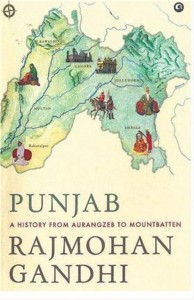
Punjab: A History from Aurangzeb to Mountbatten
Rajmohan Gandhi
Aleph (hardcover), 2009
PRs 1395
For centuries, the fertile land of five rivers in the north of the Indian subcontinent was coveted by numerous empires and invaders. In this, the first major account of undivided Punjab, award-winning historian, biographer and scholar, Rajmohan Gandhi, traces its history during its most tumultuous phase from the death of Aurangzeb, in the early eighteenth century, to its brutal partition in 1947, coinciding with the departure of the British.
Relying on fresh sources as well as previous accounts provided from opposing perspectives, the author gives us a compelling narrative about the great events of the time in the region the battles and tragedies that routinely disrupted the lives of ordinary Punjabis, the sacking of iconic cities like Lahore, Amritsar, Multan and Jalandhar by a succession of conquerors, the ravages wrought by invaders like Nadir Shah, the rise of the Sikhs culminating in the storied reign of Maharaja Ranjit Singh, Britain s successful wars against the Sikh kingdom, the Great Rebellion of 1857 and its effect on Punjab, imperialist machinations, the influence on the people by leaders of the independence movement like Mahatma Gandhi, Muhammad Ali Jinnah and Lala Lajpat Rai, as also key regional figures such as Fazl-i-Husain, Master Tara Singh, Sikander Hayat Khan and Khizr Hayat Tiwana, the devastation of Partition and much else besides.
Believing that modern India and Pakistan cannot be understood without comprehending the Punjab that was, the author also delves into the idea of Punjabiyat Punjabiness, the literature and poetry of creative giants like Bulleh Shah, Waris Shah, Iqbal, Amrita Pritam and Saadat Hasan Manto, the spiritual teachings of the Sikh Gurus and Sufi saints, and, above all, the testimonials and narratives of ordinary Punjabis, to create an unforgettable portrait of a place undivided Punjab - that continues to fascinate us (even though it broke up more than six decades ago) and of its hard-tested and resilient people, Hindu, Muslim and Sikh.
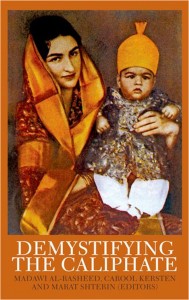
Demystifying the Caliphate
Madawi Al-Rasheed, Carool Kersten and Marat Shterin
Oxford (paperback), 2012
PRs 4590
In Western popular imagination, the Caliphate often conjures up an array of negative images, while rallies organised in support of resurrecting the Caliphate are treated with a mixture of apprehension and disdain, as if they were the first steps towards usurping democracy. Yet these images and perceptions have little to do with reality. While some Muslims may be nostalgic for the Caliphate, only very few today seek to make that dream come true. Yet the Caliphate can be evoked as a powerful rallying call and a symbol that draws on an imagined past and longing for reproducing or emulating it as an ideal Islamic polity. The Caliphate today is a contested concept among many actors in the Muslim world, Europe and beyond, the reinvention and imagining of which may appear puzzling to most of us. Demystifying the Caliphate sheds light on both the historical debates following the demise of the last Ottoman Caliphate and controversies surrounding recent calls to resurrect it, transcending alarmist agendas to answer fundamental questions about why the memory of the Caliphate lingers on among diverse Muslims. From London to the Caucasus, to Jakarta, Istanbul, and Baghdad, the contributors explore the concept of the Caliphate and the re-imagining of the Muslim ummah as a diverse multi-ethnic community.
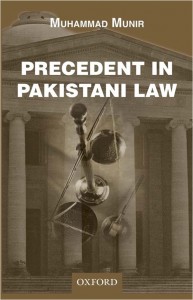
Precedent in Pakistani Law
Muhammad Munir
Oxford (hardcover), 2014
PRs 995
In the Common Law system, it is the doctrine of ‘precedent’, which courts depend upon, more than any other legal doctrine, while arriving at their decisions. The elements that constitute the doctrine of precedent are numerous and complex. Despite its considerable importance in the Pakistani legal system, the operation of this doctrine has so far drawn little academic attention. This work bridges that gap. It thoroughly examines the history, origin and context of this doctrine, as well as the rules, which guide its operation in Pakistan in the Supreme Court, the high courts, the Federal Shariat Court, and the various tribunals, with examples and analysis of case law. How is the ratio of a precedent case determined? What is the interpretation of Article 189 of the Constitution of Pakistan? Are decisions of the Supreme Court binding on the Supreme Court itself? Are the lower courts bound by the dictum of the Supreme Court? Are there decisions of the Supreme Court that are not binding on lower courts? What is the position of superior courts in India and Azad Jammu & Kashmir (AJK) on all these issues? What value should be attached to precedent in criminal cases? Can the Supreme Court, the high courts, and the Federal Shariat Court overrule their own previous decisions? And is the practice of the higher courts in Pakistan – under Articles 189, 201 and 203 GG – in conformity with Islamic law? These are some of the questions, vital to understand the operation of precedent in Pakistani law, which are discussed in this work.
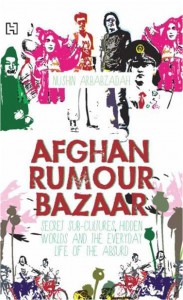
Afghan Rumour Bazaar
Nushin Arbabzadah
Hurst (paperback), 2013
PRs 2990
Ironic and humorous, witty and self-deprecatory, The Afghan Rumour Bazaar reveals the quotidian absurdities of lives framed against the backdrop of a savage war. Offering daringly new perspectives on a country readers may erroneously assume they know, Nushin Arbabzadah delves into the unacknowledged but real secret sub-cultures and hidden worlds of Afghans, from underground converts to Christianity to mysterious male cross-dressers to tales of ‘bacha-posh girlboys’. Among the individuals, fables and dilemmas she confronts are ‘Why are Imams Telling Us About Nail Polish?’ ‘Afghanistan’s Rich Jewish Heritage,’ ‘Kabul Street Style,’ ‘The Resurgence of Afghanistan’s Spiritual Bazaar,’ and not forgetting Malalai of Maiwand, who turned her headscarf into a banner and led a successful rebellion against the British. Arbabzadah reveals for the first time Afghans own vibrant internal deliberations—on sex and soap operas; conspiracy theories; drugs and diplomacy; terrorism and the Taliban; and how a long-dead soothsayer from Bulgaria accidentally shut down a newspaper. Many different Afghan sensibilities are presented in her book, yet together they offer an unvarnished, at times heartwarming, at times tragic, insight into one of the most complex and fascinating countries on earth.

